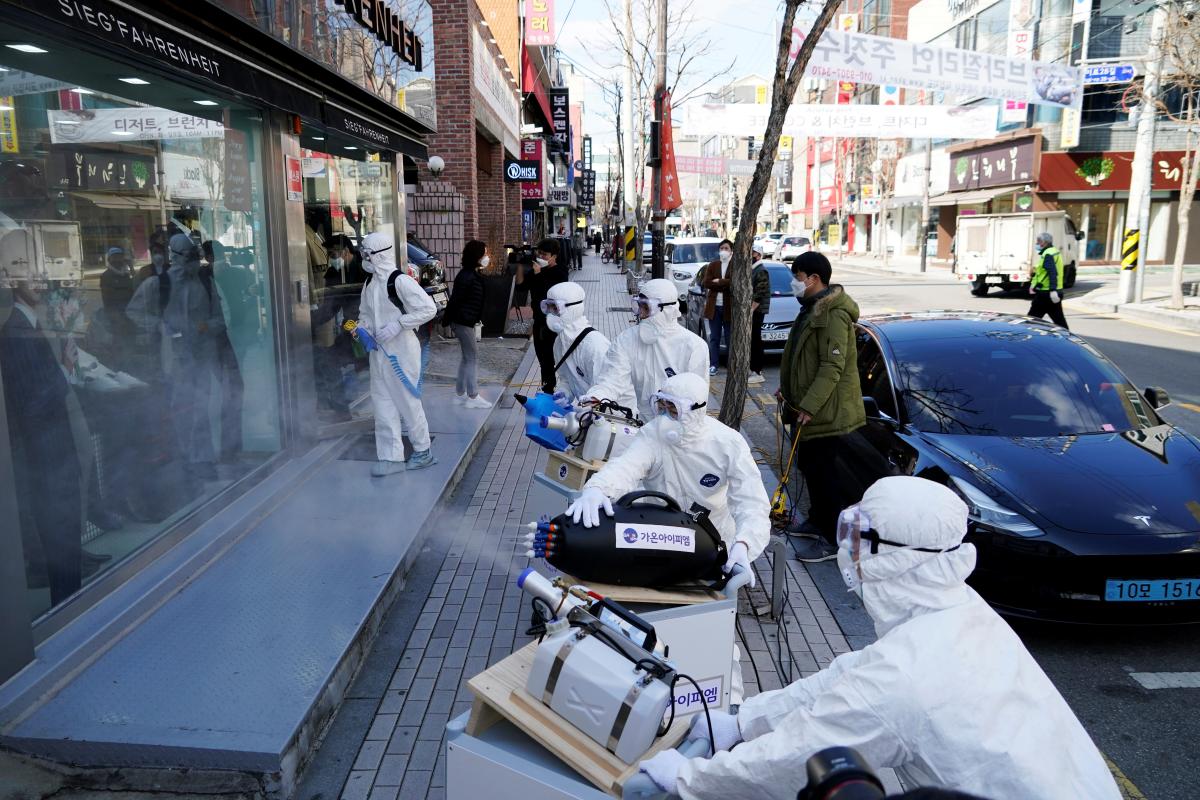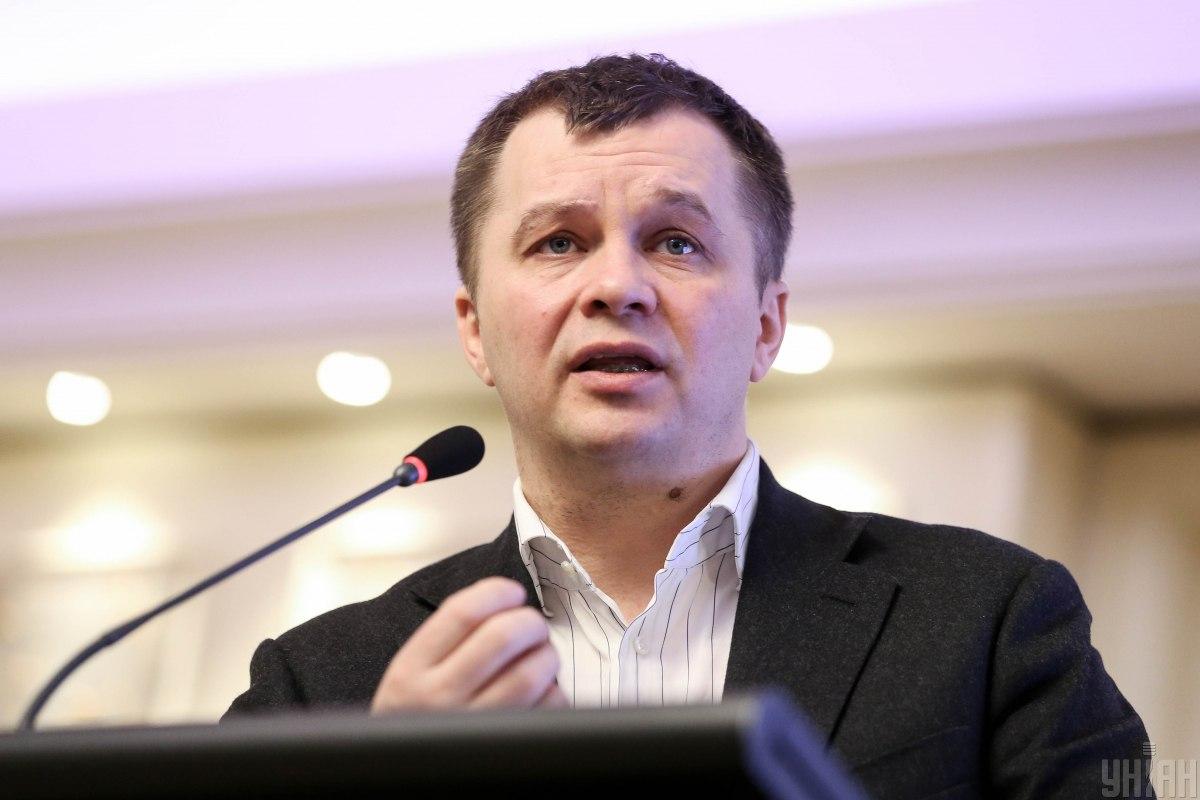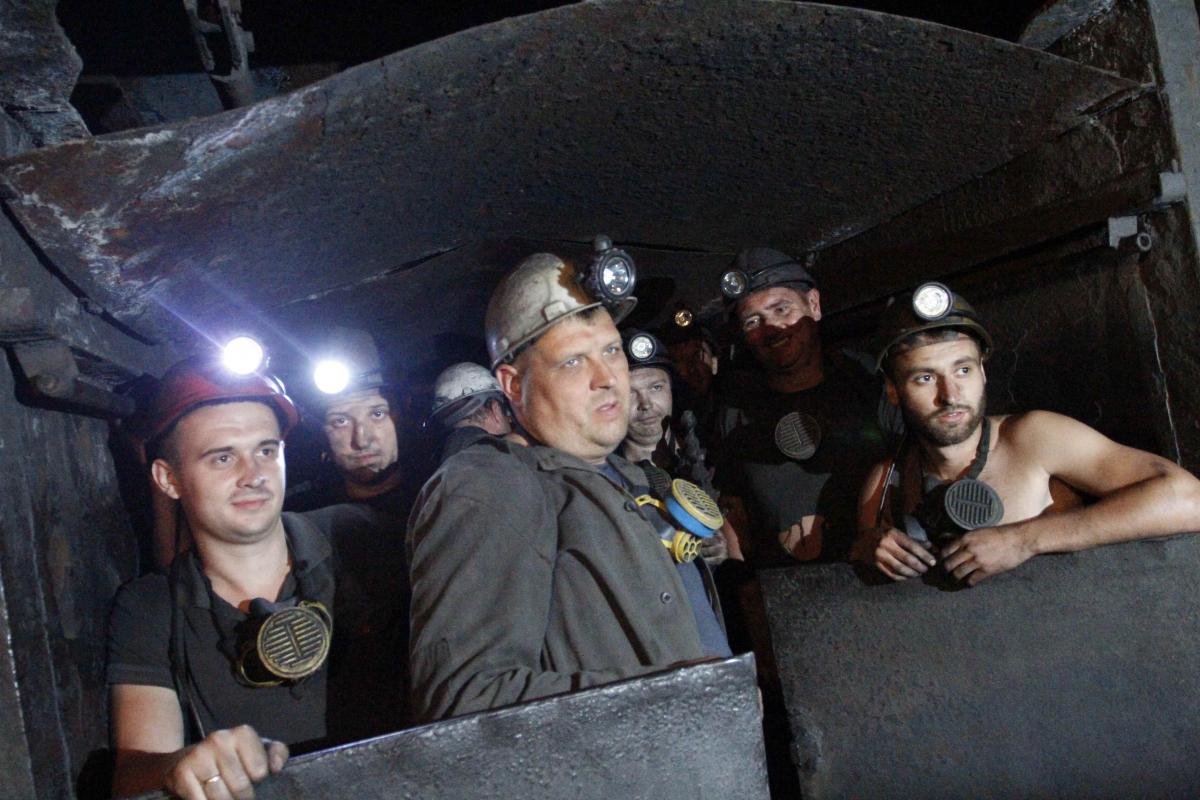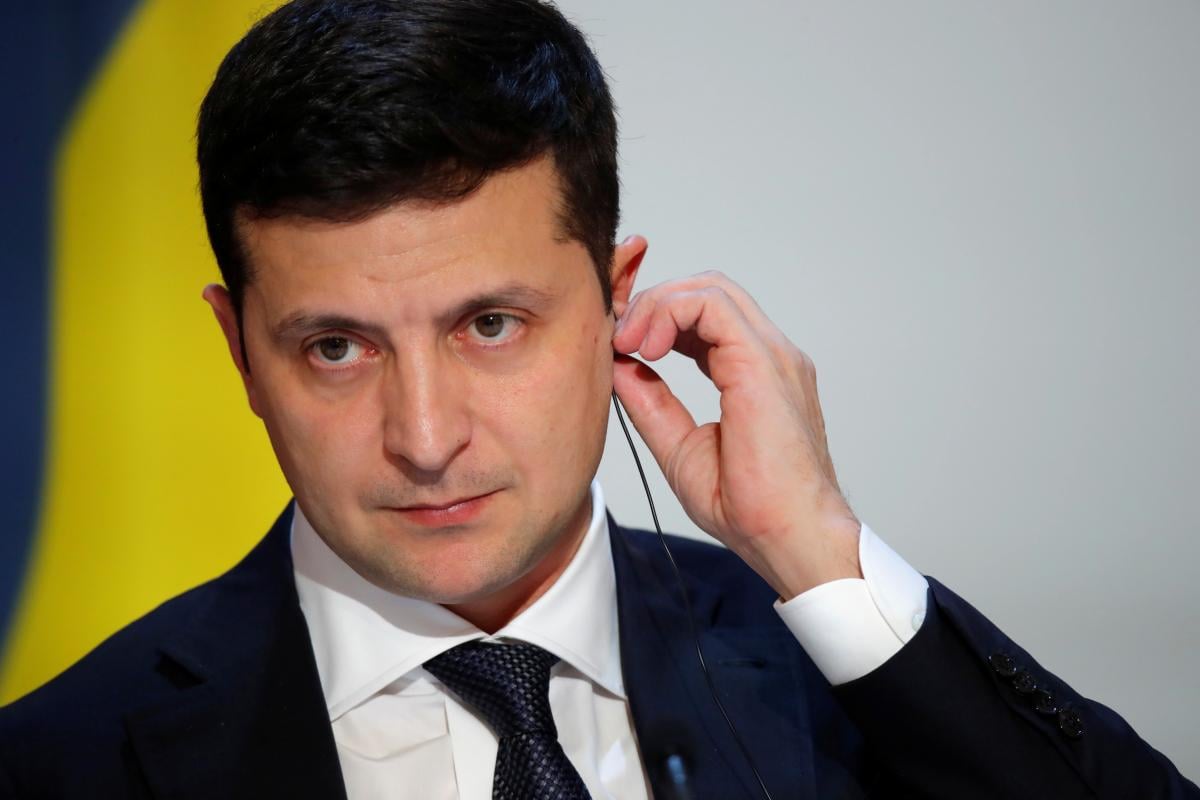
Week's balance: Coronavirus provoking global financial crisis, Zelensky promises miners to pay off wage arrears, while government submitted plan to support key industries
The large drop in stock market indices caused by the spread of the Chinese coronavirus made many suggest a new financial crisis, President Volodymyr Zelensky instructed the government to pay wage arrears to miners and limit coal imports, while the Cabinet announced a plan to support key industries – these are the main economic developments of the past week.
The last week of winter brought some bad news to the planet: the rapid spread of the Chinese coronavirus, invading new countries and regions, led to a panic among investors and brought down the indices of world financial exchanges. The price of Brent crude on Friday for the first time since December 2018 fell below $50 per barrel. Over the week, "black gold" plunged 14%, the most since 2011.
Dow Jones Industrial Average, S&P 500, and high-tech NASDAQ indices fell by more than four percent on Thursday alone, while within just a week, the key indices of world exchanges dropped 11%, the worst fall since 2008.
The world started talking of a recurrence of the global financial crisis. The trigger of the new economic troubles was the confident advance across the planet of the Chinese Covid-19 coronavirus. It is obvious that in early February, American and European financiers underestimated the consequences of this disease, believing that the epidemic would be limited to the world's second largest economy, China. However, now the moods have changed dramatically. Everyone realized that Covid-19 will affect all countries and might as well significantly change our world.

And while economists started talking about the first signs of the onset of the global economic recession as early as last summer, now it's starting to shape up at an alarming pace. Many Ukrainians who remember the painful experience of the devaluation of 2008-2009 are now asking themselves, how another crisis will hit their country and their families. Is Ukraine, which remains critically dependent on world markets, ready for a new challenge, has it learned the lessons of the previous crisis?
The Cabinet remains calm in public, claiming that they don't expect serious consequences for the domestic economy over the epidemic – that's according to Minister of Economic Development, Trade and Agriculture Tymofiy Mylovanov.
"We do not expect significant problems for our value chains, rather, imports will rise in price, which is generally good for the economy, especially for the national producer," Mylovanov said, commenting on the situation. According to him, the government is ready to respond to the possible negative consequences of the epidemic with the assistance of state support, as well as greater coordination of efforts with tax and fiscal services, and the National Bank. In addition, the Cabinet of Ministers is studying the experience of the Central Bank of China in dealing with the economic consequences of the dangerous virus.
Mylovanov emphasized that most of Ukraine's exports to the PRC are corn and sunflower oil, ores, and iron ore concentrates. For the first two positions, Mylovanov predicts export growth, while the latter could be sold to other countries seeking to increase metallurgical production.
As for the import of Chinese goods, consumer products can be replaced by domestic or European ones, and components and equipment can be replaced with products made in the EU or other Asian countries, the minister suggests.
But there is an important question: do the authorities realize the scale and acuteness of the impending issues, which in the coming weeks could grow like a snowball, and do they have enough professionalism and competence to counter these threats?
Government vows support for industry, but over time
The global financial crisis that seems to be flaring up poses a special threat to Ukrainian economy including because of the decline in industrial output in the country over the past months. At the end of 2019, this important indicator fell by 1.8% after a 1.1% increase in 2018.
Last week, the State Statistics Service published data for January. The decline in industrial output in the first month of 2020, although it slowed down after falling by 8.3% in December, still amounted to an impressive 5.1%. Compared to December 2019, industrial output in January fell by 8.4%.
According to the State Statistics Service, the largest drop in annual terms was recorded in the extraction of coal and brown coal (19.2%), production of basic pharmaceutical products (14.7%), supply of electricity, gas, steam, and air conditioning (10.8%), engineering (10.5%), and metallurgy (10.3%). Significant growth in annual terms was recorded in chemical industry and production of computers, electronic and optical products – 24.4% and 17.4%, respectively.
This negative trend forces both economists and politicians to raise the alarm. The Verkhovna Rada started talking about the need to revive the Ministry of Industrial Policy, and when deputies were hearing the report of the Cabinet of Ministers on its performance in 2019, they blamed the government for the lack of actual steps to fix the situation.
After such criticism, the Ministry of Economic Development, Trade and Agriculture this week decided to take a retaliatory move and presented a plan of state support in 2021-2023 for the country's priority sectors.

According to Minister Mylovanov, in preparing the new three-year budget declaration, the government intends to pledge more than UAH 90 billion for support programs for industry, agriculture and exports. At the same time, the largest amount of funds will go to support programs for the agricultural sector (UAH 45.5 billion over three years). To support industry, the ministry proposes to allocate UAH 32.6 billion, in particular: UAH 16.9 billion for the development of aviation industry, UAH 6 billion – to compensate for the purchase of production equipment, UAH 6.8 billion – to cofinance smart regional specialization projects, andUAH 3 billion – to create the Energy Efficiency Fund in industry.
Over the three years, it is planned to allocate UAH 12.4 billion for export support, of which UAH 6 billion – to compensate loans to exporters, UAH 6 billion – to add to the authorized capital of the Export Credit Agency, and UAH 410 million – to support and promote exports.
"It is important to note that support for export programs is provided, inter alia, by industrial enterprises. Thus, the total amount of support for the industry can be increased," the minister added. Needless to say, the amounts announced are not enough to revive the national industry, however, unfortunately, in the current conditions, these sectors can only hope for the allocation of these funds.
Promises to miners

The outgoing week once again reminded of a problem that remained unresolved throughout the years of independence. It's about the problematic coal industry. Today, wage arrears to miners exceed UAH 1 billion. And this despite the fact that in February the Cabinet of Ministers allocated UAH 163 million for payments to miners, and in December last year UAH 323 million was allocated. At the All-Ukrainian meeting of coal industry workers on Tuesday, speakers noted a disastrous situation with the payment of salaries in certain regions, since in some mines no wages have been paid for about five months. The miners also threatened authorities with rallies in the capital if debts weren't paid.
President Volodymyr Zelensky, who took part the meeting, instructed the government to pay the miners' salary arrears within two months.
"I ask that in the next two months – March and April – all arrears to miners be completely paid off. If they are not paid, it will be fair if the government members don't receive their salaries throughout these months," the head of state said.
Zelensky did not stop there, urging Cabinet members to visit mining cities in order to better understand the needs of coal-mining regions. The President also instructed the Minister of Energy and the Ecology, Oleksiy Orzhel, to conduct a personnel and financial audit of coal enterprises and transmit information to law enforcement agencies.
Also, on the instructions of the head of state, the government shall create a Coordination Center for the transformation of the coal mining industry.
It is worth noting that at this meeting Zelensky set the Cabinet of Ministers the task of limiting the imports of electricity and coal, and allowing the imports of only those grades of coal that aren't mined in Ukraine, as well as providing a guaranteed sales market for domestic fuel.
Outlining his version of improving the industry, the president voiced what he believes is a "great idea" that raised some eyebrows. Zelensky suggested that DTEK energy holding owner Rinat Akhmetov, who owns the lion's share of the national thermal energy, buy another state-owned company, Centrenergo, along with unprofitable state mines.

"If you are not ready, while the Antimonopoly Committee, as you say, are against it, I'll talk to them, and they will be in favor. But that is not the question. You must also help us then find partners like you, the strong ones in the industry, and find people who could privatize and invest in mine modernization. To help the state do this," Zelensky said, referring to Maksym Tymchenko, CEO of DTEK Energy Holding.
Apparently, the president's proposal turned out to be too "generous" because Tymchenko said that DTEK energy holding wasn't interested in acquiring Centrenergo. "I believe that we have sufficient thermal generation. Our priority is the development of investments in green generation. Therefore, we will not take part in privatization. I think that new players are needed in order to have lively competition," he added.
In a commentary to UNIAN, Tymchenko said that DTEK was not interested in privatizing unprofitable state mines, either. "We have a large enough volume, today we produce about 80% of the country's coal, this is enough," he said.
Well, for now, instead of a systematic solution to the problems in the coal industry, the government once again decided to limit itself to a budgetary handout. We shouldn't forget that Ukraine is now having issues with filling the state treasury, because there is no full guarantee for the allocation of a billion hryvnias in the next two months to pay off debts to miners. And the point is not only in the limited possibilities of the treasury: the situation is also aggravated by the reduction in the country's demand for the extraction of significant volumes of coal due to a warm winter and a decrease in industrial output.
In connection with the reduction in the load on heat generation, Minister Orzhel admitted several weeks ago that Ukraine could not sell all the coal mined, so the industry needed a "comprehensive" reform. By the way, the Ministry of Energy at the end of January unveiled a draft concept of the Green Energy Transition of Ukraine until 2050, according to which the share of renewables in the country's energy balance should grow to 70% by 2050 with a complete rejection of coal energy.
Is there a leader in power who is ready to try on the role of British Prime Minister Margaret Thatcher, who addressed the issues of her country's coal industry in a too radical way?
The upcoming week promises to be full of economic news. Coronavirus and its impact on the global and Ukrainian economies will also remain in focus. In addition, from Tuesday, the Verkhovna Rada returns to considering the bill on the land market. So far, the deputies have considered almost 1,200 amendments to the draft, having gone a quarter of the way, so we will be seeing some hot parliamentary days.
Dmytro Shvarts

